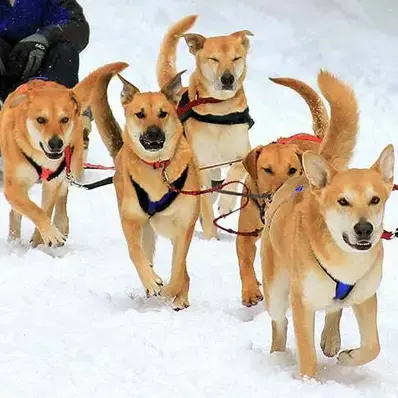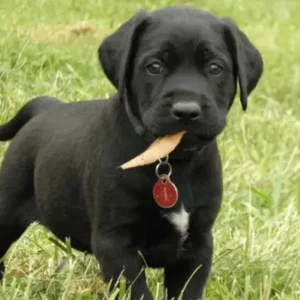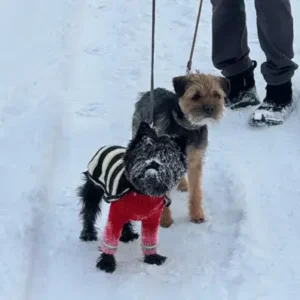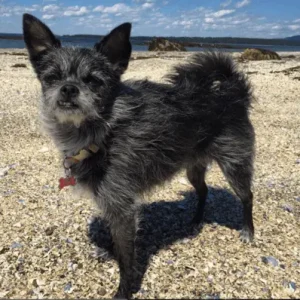Chinook History/Origin
When Arthur Walden bred a farm dog with a husky on his Wonalancet, New Hampshire farm, he inadvertently created a legendary line of sled dogs. With experience as a dog driver in Alaska, Walden introduced sled dog racing to New England.
Among the puppies from that litter, one stood out for its exceptional appearance, temperament, and working ability. This puppy, named Chinook after the warm winds that melt Alaska snow, became the breed’s namesake.
Chinook’s remarkable abilities did not go unnoticed. Admiral Byrd, planning his 1928 Antarctic expedition, turned to Walden and his Chinook dogs for transportation. Chinook was part of the team.
Though the expedition succeeded, Chinook tragically wandered off at age 12 and was never found. In tribute, a portion of Route 113A leading to Chinook’s hometown in New Hampshire was named Chinook Trail.
Chinook History- Source: Chinook Club of America Inc
After Walden retired, Milton and Eva Seeley, along with Julia Lombard, took on the responsibility of preserving the breed. Perry and Honey Greene later became the sole breeders of Chinooks.
The breed faced a decline and was recognized by the Guinness Book of World Records as the world’s rarest breed, with only 28 Chinooks remaining at one point.
In 1981, a dedicated group, including Neil and Marra Wollpert, Kathy Adams, and Peter Abrahams, began efforts to save the breed. Their work proved successful, though Chinooks remain relatively rare.
They have gained recognition from the United Kennel Club and also from the American Kennel Club under Working Group. The Chinook breed’s history is one of resilience, with a passionate community striving to preserve its unique heritage.
Chinook Personality
Chinooks are one of the dog breeds known for their gentle and even-tempered nature. They are calm and not prone to shyness or aggression, making them excellent family pets. Their intelligence is a standout feature, as they quickly learn commands and enjoy mental stimulation. Chinooks form strong bonds with their families and are eager to please, which makes training a rewarding experience.
While they are generally patient and tolerant, Chinooks are initially reserved around strangers, requiring consistent socialization to adapt to new people. They are not excessive barkers but may use vocalizations like whining or “woo-wooing” to communicate. Their affectionate and loyal nature makes them well-suited for families with children and other pets.
- Potential Challenges
Despite their friendly disposition, Chinooks’ intelligence and energy levels necessitate regular mental and physical stimulation. Without adequate exercise and companionship, these purebred dogs may experience separation anxiety or become bored.
Addressing their needs through proper training, socialization, and activity can help them thrive as loving and well-adjusted companions.
Chinook Physical Appearance
The Chinook is generally a large dog with a tawny coat and either floppy or erect ears that develop around six months of age. They have almond-shaped eyes that give them an intelligent appearance.
- Size
Male Chinooks typically stand between 24 to 26 inches tall at the shoulder and weigh around 90 pounds on average. Females generally stand 22 to 24 inches tall at the shoulder and weigh about 65 pounds on average.
- Coat color
Chinooks have a tawny color coat that ranges from light honey to reddish-gold. Some may feature black markings near their eyes and on their ears, muzzle, and occasionally on the tail. Buff markings can also appear on their cheeks, muzzle, throat, chest, breeches, toes, and belly.
Light honey Chinook – Source: chinook.dog
Reddish-gold Chinook- Source: platformchinooks
Chinook Gender Differences
The only difference between male and female Chinooks is their size, with males generally being larger than females.
Chinook Feed/Nutrition
Adult Chinooks typically require between 3 1/8 to 4 5/8 cups of high-quality dog food daily, split into two meals. However, the exact amount depends on factors such as size, age, metabolism, and activity level. Each dog has unique nutritional needs, so it’s essential to adjust their food intake accordingly.
Opting for high-quality dog food ensures better nutrition, allowing you to feed your Chinook less while maintaining their health. It’s best to measure their food portions and feed them twice daily to keep them in optimal condition. Avoid feeding grapes, as they are toxic to dogs and can cause kidney failure, even in small amounts.
Chinook Health
Chinooks, like all breeds, may be prone to certain health issues, although they are generally robust. It’s important to understand these conditions if considering a Chinook:
- Hip Dysplasia: This hereditary condition affects the hip joints, causing pain and mobility issues. Early screening with X-rays helps identify potential problems, and responsible breeding practices aim to reduce its occurrence.
- Cataracts: Opacities on the eye’s lens can lead to vision impairment or blindness, especially in older dogs. Surgical removal may improve vision, depending on the severity and the dog’s health.
- Seizures: Chinooks may experience seizures, characterized by sudden, abnormal brain activity. While medication can manage seizures, they cannot be cured, and breeding dogs with a seizure history is typically avoided.
- Allergies: Some Chinooks may develop dry, itchy skin or hot spots, often due to allergies or skin conditions. Regular grooming and veterinary care can help manage these issues effectively.
- Gastrointestinal Issues: Chinooks can suffer from chronic gastrointestinal problems like diarrhea or vomiting, which may require dietary management and veterinary intervention for proper care.
Chinook Care and Grooming
Chinooks thrive on human companionship and prefer to live indoors rather than outdoors. They adapt well to different home environments as long as their exercise needs are met. These active dogs require 30 to 60 minutes of daily exercise through walks and runs in secure, spacious areas.
Regular brushing is essential to maintain the Chinook’s coat cleanliness and manage shedding, brushing down to the skin. Baths are typically necessary a few times annually. Additionally, due to their fast-growing nails, weekly nail trimming is vital, and brushing teeth two to three times weekly prevents dental issues and bad breath.
Grooming sessions also foster bonding and monitor overall health. While grooming, check ears, skin, mouth, feet, and eyes for signs of irritation, sores, redness, or discharge.
Introducing grooming routines early ensures a positive experience with praise and rewards, facilitating easier veterinary exams as they mature. Training your dog to sit is a basic yet essential command that promotes good behavior and makes handling easier during grooming and vet visits.
Chinook Rescue Groups
Rescue groups dedicated to Chinooks focus on rescuing, rehabilitating, and rehoming these dogs in need. They provide temporary shelter, veterinary care, and behavioral rehabilitation to ensure each Chinook finds a loving forever home. These organizations rely on donations, volunteers, and foster families to support their mission of saving and advocating for this rare and beloved breed.
Chinook Price
The price of a Chinook typically ranges from $800 to $1,200, depending on factors such as breeder reputation, pedigree, and location.
Chinooks for sale are typically found through reputable breeders or rescue organizations committed to the breed’s well-being. Responsible breeders prioritize health screenings and socialization, ensuring puppies are raised in optimal conditions.
Interesting Facts
- They made an appearance in a movie called “ The Chechahcos”. They were part of the Sled Dog team.
The Chechahcos – Source: IMDb
- Chinooks were designated as the official state dog of New Hampshire in 2009 due to their historical significance in sled dog racing and Arctic exploration.
Best For
Chinooks are best suited for individuals or families who enjoy an active lifestyle and can provide ample companionship. They thrive with owners who can meet their exercise needs and appreciate their affectionate and loyal nature.
Top Names
| Male Chinook Names | Female Chinook Names |
| Yukon | Aurora |
| Timber | Willow |
| Scout | Luna |
| Kodiak | Sage |
| Denali | Misty |









 Chinook History- Source:
Chinook History- Source: 

 Light honey Chinook – Source:
Light honey Chinook – Source:  Reddish-gold Chinook- Source:
Reddish-gold Chinook- Source: 
 The Chechahcos – Source:
The Chechahcos – Source: 






